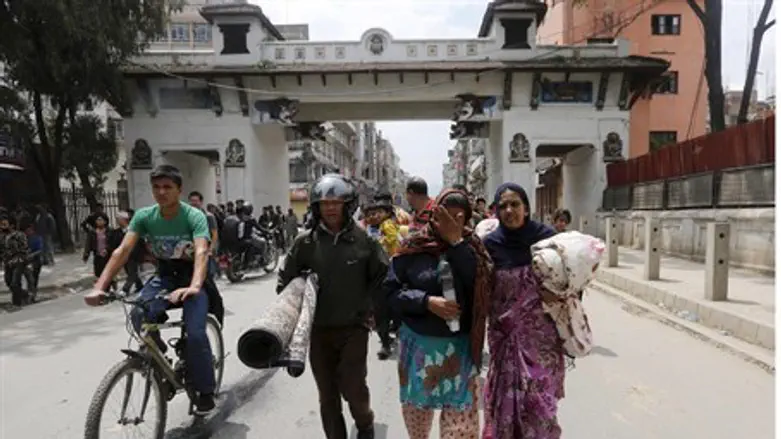
Nepalese authorities put the death toll from the gigantic earthquake that struck on Saturday at over 3,200 early on Monday morning, as new bodies continue to be discovered among the wreckage and aftershocks continue to wreak terror among the survivors.
The exact death toll was placed at 3,218 people according to Reuters, although given that the remote regions have yet to be given full attention due to the massive damage in Kathmandu, the actual figure is anticipated to be much higher.
Dramatic video footage of the moment the earthquake hit triggering an avalanche at Mount Everest's base camp was uploaded to YouTube on Sunday by German climber Jost Kobusch, highlighting the force of the natural disaster. At least 17 climbers reportedly died at the camp; viewer discretion is advised due to strong language.
Saturday's titanic earthquake measured a whopping 7.6 on the Richter scale, but the Hindustan Times reports that since it struck, no less than 83 aftershocks measuring at least 4 on the scale have ravaged the country of 28 million people.
One aftershock reached as high as 6.9 on Sunday afternoon, with over 200 minor tremors under 4 on the scale giving expression to the great tectonic unrest in the region.
"The intensity and frequency of the shocks are likely to gradually come down, but it could take another 24-36 hours or more for that," Lok Bijay Adhikari, chief of National Seismological Center, was quoted by the paper as saying.
At the Chabad Center in Kathmandu, Rabbi Hezki and Chana Lifschitz noted that the word had gone out that the center is providing aid, and Israelis and locals alike have been streaming in to find shelter.
"The main challenge now if that everyone will have warm food given that basic goods like flour, rice, eggs etc. are growing scarce," reported the couple.
Speaking about the Israelis in Nepal who have yet to be accounted for, they wrote "there are still several dozens friends who are cut off from contact. G-d willing we will reach them by every means possible. You must understand that the communications here are so damaged, making the challenge great."
An Israeli search and rescue mission set off on Sunday to join the efforts; it is to establish a field hospital in the disaster zone to aid the wounded.
The New York Times reported that as a result of the aftershocks, people in Kathmandu slept on mattresses and cots on the streets and anywhere they could on Sunday afternoon, out of fear that an aftershock would collapse their homes.
Samir Thapa, a 30-year-old security guard, was quoted as saying, "everyone is scared. Everyone is saying it will come again. No one is going to sleep at home."
The destruction didn't only hit residents but Nepalese history as well, with numerous ancient temples reduced to rubble.
"It was a monstrous sound, like the demons had descended on the mountain," Nepalese guide Khile Sherpa told Reuters of the moment when the earthquake set off an avalanche in Nepal's famous mountains.
The disaster has highlighted Nepal's poor medical state; according to a 2011 World Health Organization (WHO) report, the country has only 2.1 physicians and 50 hospital beds for every 10,000 people.
